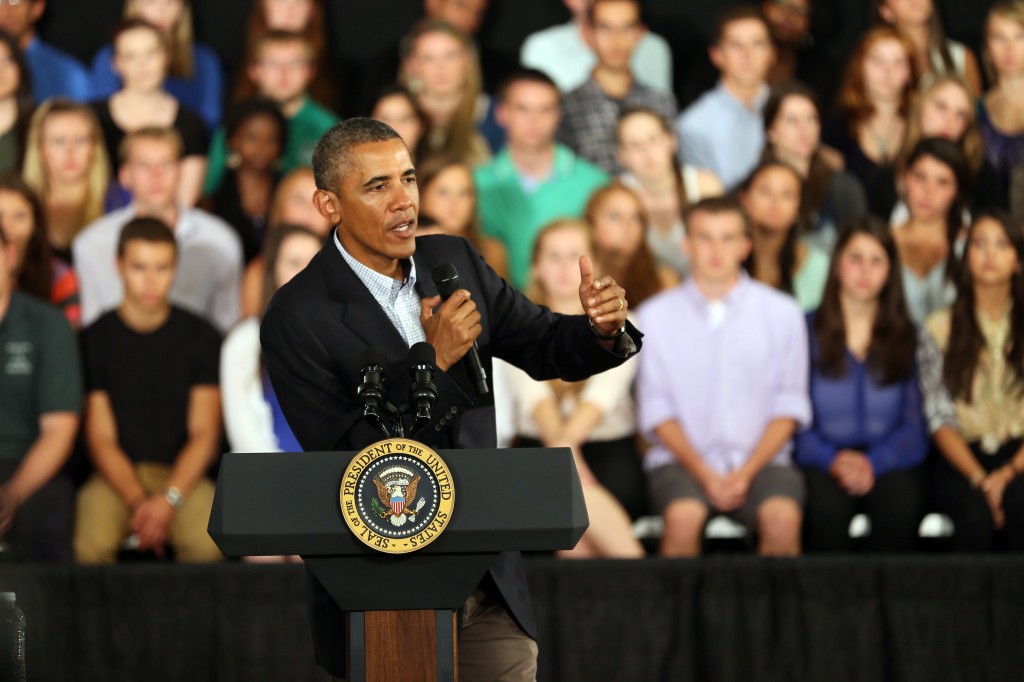
In response to a climbing national student debt paired with a discrepancy between college loans and post-graduate income, President Barack Obama developed a proposal to better align college costs with how much students will make after graduation, which he debuted during a bus tour of upstate New York and northeastern Pennsylvania.
Before holding a town hall-style event at Binghamton University, Obama traveled to the University at Buffalo and Henninger High School in Syracuse to announce and discuss his plan. But the president’s remarks at BU differed from his addresses at the other schools on the bus tour: Rather than delivering a speech to a packed event center, Obama spoke briefly to a few hundred guests in the Mandela Room in the Old University Union before he opened the floor to questions from the audience.
He began his address by promising to try a spiedie and, on a more serious note, explaining his new plan to increase college affordability, which he unveiled at the University at Buffalo the day before. The proposal includes plans for a college ranking system based on factors like retention rate and student debt as well as plans to expand the Pay As You Earn program, where student loan payments for eligible graduates are capped at 10 percent of their monthly income. President Obama also mentioned plans to encourage colleges and universities to find ways to save students money by reducing classroom time, either with online classes, dual degree programs or programs that enable students to earn college credit in high school.
BU President Harvey Stenger said he found the town hall-style format conducive to meaningful debate and conversation.
“His introductory remarks were brief, he didn’t go into a lot of details about his proposals,” Stenger said. “What was great about his visit was that he stood there, he looked into the crowd and he chose people at random. Every question was on a germane, appropriate topic, it was well stated, and he was impressed by the questions.”
President Obama took questions from several students, including Donald Lodge, director of the Rainbow Pride Union and a senior double-majoring in Chinese and political science. Lodge asked the president if any funds would be available for LGBT students who lose funding for college after they come out to their parents.
“The programs that we have in place don’t discriminate and shouldn’t discriminate. And the good news is I think the phenomenon that you just described is likely to happen less and less and less with each successive year,” said President Obama. “So I don’t suspect that we’ll have special laws pertaining to young people who are cut off from support by their parents … but we are going to make sure that all young people get the support that they need so that if their parents aren’t willing to provide them support, and they’re functionally independent, that they’re able to still go to college and succeed.”
Lodge said he wasn’t disappointed with the answer, but would like to see improvements in the future.
“I kind of figured he was going to respond that way, because I knew there wasn’t going to be any funding for anything LGBT directly, but I was hoping maybe in the future, either he or the next president to spend a little bit more money on a scholarship for people who lose their homes or lose their funding for college because they came out to their parents,” Lodge said.
Lodge called the experience of speaking directly to the President of the United States “surreal.”
“I was really nervous,” he said. “As he was talking I listened and was like, ‘Wow, he’s responding to my question, but I don’t remember what I asked.’”
Lodge was one of around 50 students that was selected for special seating right behind the president. Harry Catalani, an undeclared freshman who had been on campus all of two days before the presidential visit, was also selected for special seating.
“It was definitely a memorable experience, my second day of college I got to sit behind the president and be on TV,” he said. “I’m just really grateful that I even had the opportunity.”
Obama also took questions about the future of Head Start programs around the country, funding for for-profit schools, green energy and instances of institutional racism in education.
The town hall meeting was attended by several hundred students, faculty and staff chosen at random from a lottery.


